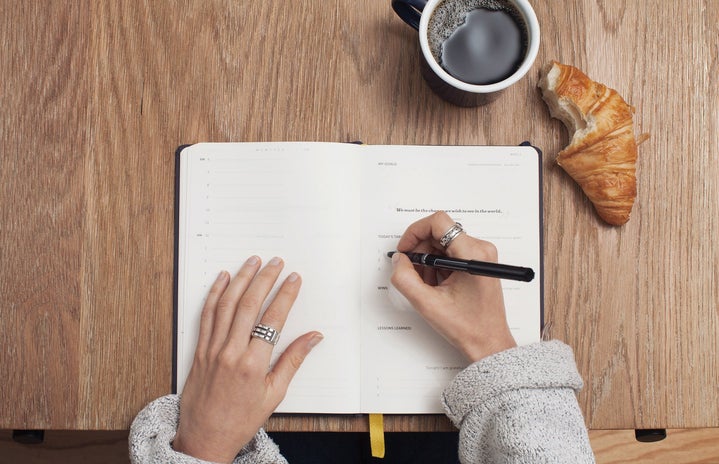I’ve had my share of journals in my lifetime, each a hardcover notebook with endless pages. I would try writing in them every day, but they always stay empty. I love writing, but I could never fully bring myself to write about my day or how I felt. It seemed unnecessary to devote time to recount my day play-by-play when it was already over.
Journaling felt more like an assignment, another thing I needed to do before the day was finished. Due to this difficulty, I tried prompts and using keywords for inspiration, but it never stuck. After a few days, I would forget about it until I had the mental capacity to think of the journal again.
To combat these difficulties, I tried a new approach this past week. I started picking up the journal whenever I felt I needed it. I didn’t schedule it as an end-of-the-day activity, I didn’t connect any prompts to it, and I didn’t force myself to journal every single day.
Over the week, I only had four distinct journal entries. Each one followed some random life event, the good and the bad. Most often, I would pick it up and only write a few sentences at a time throughout the day. It was nothing substantive but enough to feel like the thoughts running through my mind actually went somewhere. Reflecting upon them now, the entries seem like spaces to vent or celebrate mundane occurrences.
This reflection helped me realize that journaling doesn’t need to be a recap of an entire day, but just a jotting of whatever I’m feeling at a specific time. Or it could even be used at multiple points of the day if I thought it necessary.
This experience taught me a surprising amount about myself and mindfulness in general.
I learned that there is no limit to what I could journal about. One day, I wrote a short story about a girl who lived on the moon and observed the rest of the solar system from there. The next day, I simply wrote, “I long for stillness.” This reflection helped me realize that in the past, I treated my journal as a diary in the traditional sense — a space where people usually recounted and reflected on the day’s events. Trying the approach of writing about whatever was in my head at random points gave me the freedom I needed to not only release any feelings but also be more creative.
Letting the words out onto a physical sheet of paper helped me conceptualize what I was feeling at the time. Opening the journal and just jotting down whatever came to mind really helped me understand myself a little better. Writing on paper made things more real, allowing me to reflect properly upon rereading—even small details, like differences in my handwriting, contributed to my reflections. I could see what I was really thinking and try to figure out how to move forward.
I learned that journaling makes me feel better overall. It’s an easy place to let things out and bring up feelings I may not have addressed yet. The entries felt a bit repetitive, indicating that what I was always drawn to write about needs to be properly addressed. I would also notice that the time of day I tended to reach for the journal was around midday when I was likely feeling more stressed.
Of course, different journaling methods may be better for other people or situations, but this approach helped me learn how journaling can act as a stable point of reflection. Given what I’ve taken away from the past week, I can definitely see myself putting my stacks of journals to good use.



